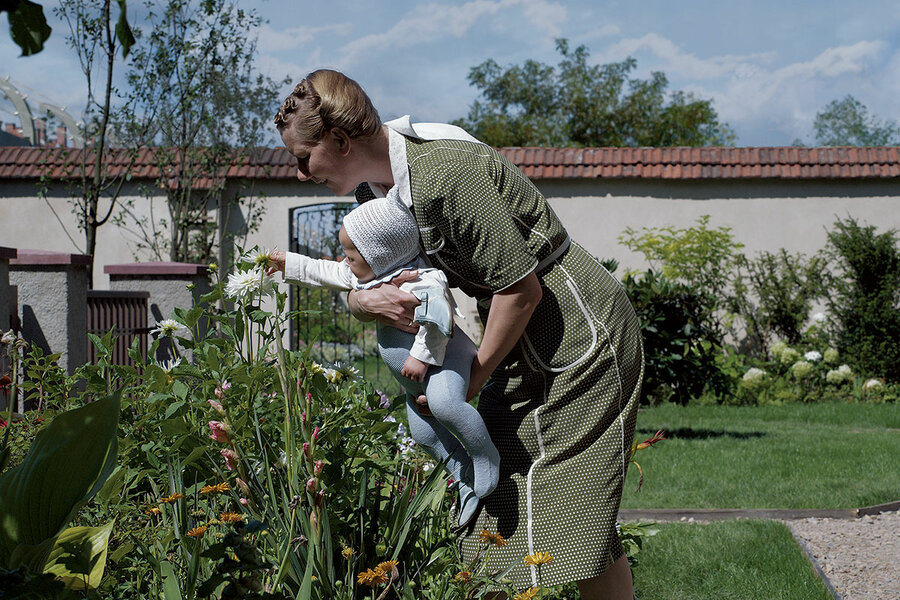‘The Zone of Interest’ asks us to consider the unthinkable
Loading...
“The Zone of Interest” opens on a pastoral note. A German family is enjoying a lakeside picnic beside a lush forest. Birds are chirping, children are romping. This idyllic tableau belies what is soon to be revealed: This family resides in a sprawling villa separated by a wall adjacent to the Auschwitz concentration camp. The father, Rudolf Höss (Christian Friedel), is the camp’s commandant.
The juxtaposition of these two realms – the Arcadian and the hellish – is the heart of this movie, by far the most powerful I’ve seen this year. (It won the Grand Prix, a top honor, at the Cannes Film Festival in May.) Very loosely adapted from the 2014 Martin Amis novel of the same name, and written and directed by Jonathan Glazer, it is told almost entirely from the perspective of the perpetrators, not the victims.
Most of the scenes take place in and around the villa. We are never brought inside the camp. But we see the crematorium’s chimney over the wall. We see the trains arriving, billowing smoke; we hear the occasional rifle shots and screams.
Why We Wrote This
What lessons lie in a Nazi officer’s effort to create an idyllic family life? “The Zone of Interest” juxtaposes the Arcadian and the hellish in what the Monitor’s critic says is the most powerful film he’s seen this year.
Rather than distancing us from the horror, this chilling, steady-state approach only increases it. What we imagine is going on behind that wall is far more vivid than anything Glazer could show us. He presents the quotidian life of Rudolf and his wife, Hedwig (Sandra Hüller), and their five children without any authorial emphasis. We stare at them and we gasp. What we are witnessing is not so much the banality of evil as the nothingness of evil. The silence at the center of this moral void is deafening.
There is a semblance of a story, but Glazer is careful not to draw on the usual melodramatic tropes. He keeps his camera somewhat apart from the characters, rarely indulging in close-ups, all the better to observe these people with a kind of taxonomic omniscience.
Rudolf, before he is eventually tasked with moving on to another camp, is a punctilious, contented autocrat. He reads his children bedtime stories, including “Hansel and Gretel,” in which the big bad witch is incinerated. With a pair of Nazi emissaries, he coolly discusses plans to increase the efficiency of the ovens. (The real-life Höss was executed for war crimes in 1947.)
Hedwig, meanwhile, tends the estate’s elaborate garden, which she compares to paradise. She tries on dresses and mink coats culled from those imprisoned next door. One of her friends is delighted to find a diamond secreted inside a tube of toothpaste. She remarks how clever the Jews are. The Höss boys collect gold teeth. All this is presented with a ghastly matter-of-factness.
How should we connect this film to our incendiary modern world? Can we pretend all this took place on another planet, perpetrated by monsters and not people? In interviews, Glazer has said that he wants the movie to be seen as about the present as much as about the past. He has encouraged audiences to recognize our similarities to the perpetrators rather than to those who were murdered.
And yet, despite extraordinary performances from Friedel and Hüller, the people presented here lack any conventional dramatic psychology or character development. They simply are. I didn’t see myself in them so much as I recognized that, alas, they too are human.
This is not meant as a criticism. It would be reductive, I think, to attempt to explain Rudolf or Hedwig. And viewing the Höss family, or the Holocaust, as somehow symbolic of a generalized evil seems to me equally problematic.
Yes, we can draw links between then and now, but, in a way, Glazer’s film contradicts his own public sentiments. His depiction of this agonized world is so enveloping and unrelenting that, at least for me, it stands wholly alone, untethered to our current traumas. If there is a larger value to this film, it resides in its implicit, impassioned defense of the sanctity of those who perished in the camps. This dirge for the dead is also an affirmation of life.
Peter Rainer is the Monitor’s film critic. “The Zone of Interest” is rated PG-13 for thematic material, some suggestive material, and smoking.







